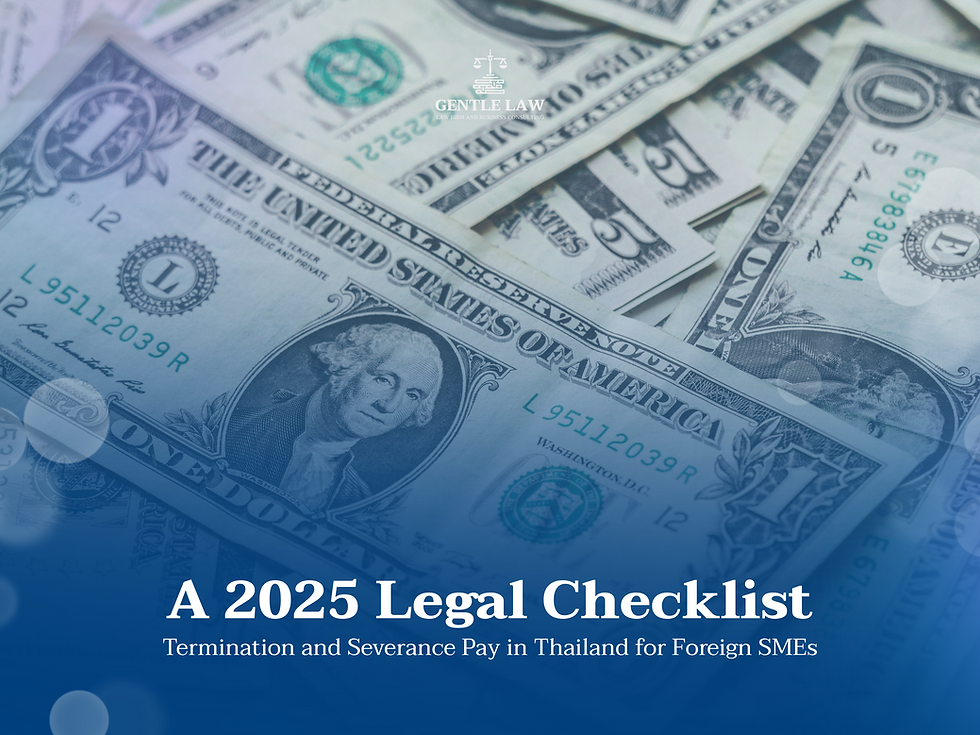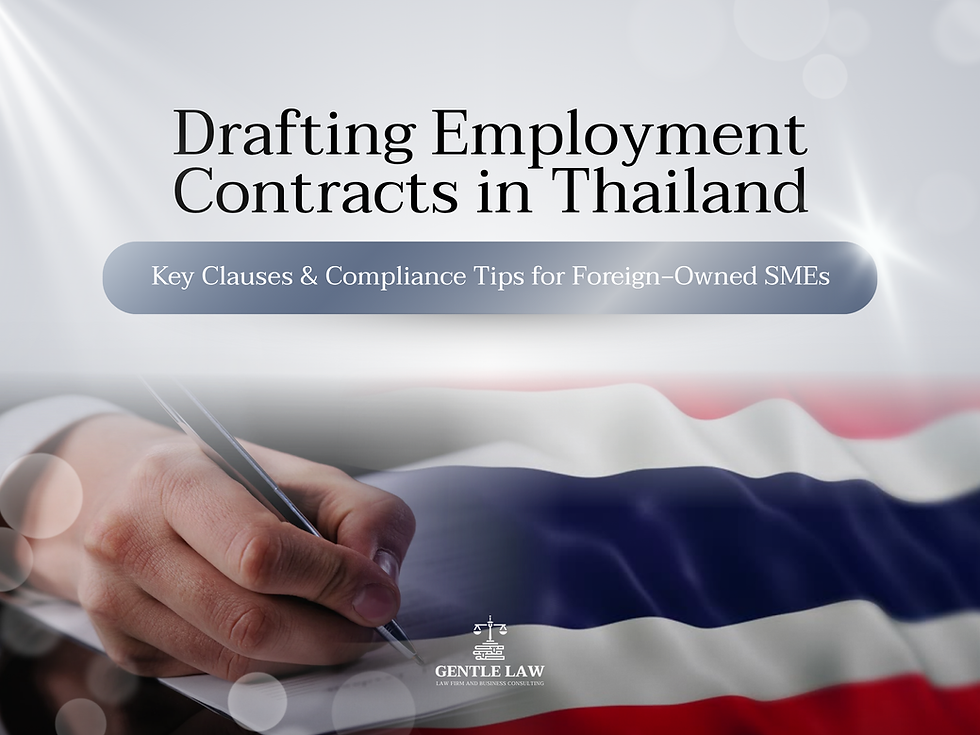Termination and Severance Pay in Thailand for Foreign SMEs: A 2025 Legal Checklist
- gentlelawlawfirm
- Sep 10, 2025
- 4 min read

Introduction
Ending employment in Thailand requires careful compliance with statutory rules on notice, cause, documentation, and payments. This guide explains how severance pay in Thailand works, when no severance is due, what notice is required, and what special severance obligations apply in mass layoffs or relocations. All rules below are drawn from the Labour Protection Act B.E. 2541 as amended, with citations to the official English translations.
The core legal framework
Labour Protection Act B.E. 2541 and later amendments, including Act No. 7 B.E. 2562.
Key operative provisions: Section 17 on notice, Section 118 on severance tiers, Section 119 on dismissal without severance, Sections 120 to 122 on relocation and reorganization special severance, and Section 75 on temporary business suspension pay.
Severance pay in Thailand: statutory rates under Section 118
If an employee is terminated without a Section 119 cause, employers must pay severance by length of service:
Length of continuous service | Statutory severance |
120 days but less than 1 year | 30 days of last wages |
1 year but less than 3 years | 90 days |
3 years but less than 6 years | 180 days |
6 years but less than 10 years | 240 days |
10 years but less than 20 years | 300 days |
20 years or more | 400 days |
These thresholds, including the 400-day tier for 20 years or more, appear in Section 118 following the 2019 amendment.
Fixed-term contracts: Section 118 does not apply when a properly defined fixed-term contract ends at the agreed date for a genuine project or seasonal work, provided the contract meets the statutory criteria.
When no severance is payable: Section 119 causes
No statutory severance is due if the termination is for a listed serious cause, which includes: dishonest performance, intentional or grossly negligent damage, serious breach of lawful work rules after a written warning, absence for 3 consecutive working days without justification, and final imprisonment in specified situations. If the termination letter does not state the Section 119 facts at the time of dismissal, the employer cannot later rely on them.
Notice of termination and pay in lieu
General rule: If no definite term is stated, either party may terminate by written notice at or before a wage-payment due date, to take effect on the next due date. The law caps contractual notice at three months. Employers may pay wages up to the termination date stated in the notice and dismiss immediately. Section 17 governs this.
Reorganization layoffs: If dismissal results from reorganization due to machinery or technology, employers must give at least 60 days prior written notice to employees and the Labour Inspector. If not, special severance in lieu of notice equal to 60 days’ wages is required, in addition to ordinary severance if applicable.
Special severance for relocation and reorganization
Relocation affecting livelihood: If a relocation significantly affects the employee or family, the employee may refuse within 30 days and is entitled either to special severance in lieu of advance notice of 30 days’ wages if notice rules are breached, or to special severance at not less than the Section 118 rate when the employment ends because of the relocation.
Reorganization terminations: For technology or machinery-driven redundancies, failure to provide the 60-day advance notice triggers special severance in lieu of notice equal to 60 days’ wages, plus ordinary severance. If the affected employee has over six years of service, Section 122 adds special severance on top of the Section 118 severance, capped at 360 days for that special component.
Timing of final payments and document hygiene
Final pay deadline: Wages, overtime, holiday pay, and other amounts due must be paid within three days from the date of termination. This is a separate rule in addition to severance obligations.
Temporary suspension pay: If the employer temporarily suspends business for reasons other than force majeure, Section 75 requires payment of at least 75 percent of the employee’s wages for the period of suspension, with prior written notice to employees and the Labour Inspector.
Practical compliance workflow for foreign SMEs
Map the reason for termination against Section 119. If none applies, calculate Section 118 severance by tenure.
Check whether the case involves relocation or reorganization, which may trigger special severance and notice rules under Sections 120 to 122.
Issue a termination letter that states the factual grounds and the legal basis. This preserves your ability to rely on Section 119 if applicable.
Observe Section 17 notice timing or pay in lieu as required.
Pay final wages within three days and process severance and any special severance within the statutory timelines. Keep bilingual payroll evidence.
Keep internal minutes and checklists for potential Labour Inspector review.
How GENTLE LAW IBL can help
Our team audits your employment contracts and work rules against Thai law, prepares compliant termination documentation, calculates severance and special severance, and liaises with the Labour Inspector. This reduces litigation risk while preserving management flexibility.
Conclusion and call to action
Handled correctly, severance pay in Thailand is predictable and manageable. Errors in cause, notice, or timing create avoidable exposure. For a fast, confidential review of your planned terminations and severance calculations, contact GENTLE LAW IBL for a legal and HR-ready action plan.
📩 Book a consultation: https://gentlelawibl.com



